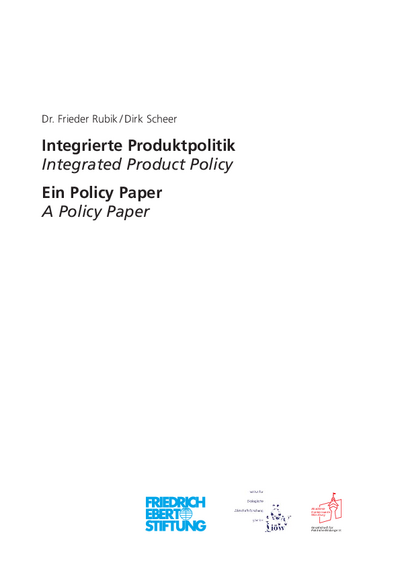Integrated Product Policy. A Policy Paper
Integrated Product - A Policy Paper aims at practically oriented implementation proposals for modern product policy. The current status of Integrated Product Policy (IPP) is first demonstrated in a categorising evaluation. The political approach developed particularly in Europe aims at improving the ecological properties of products and services, and pursues a holistic, actor-oriented approach with the guiding principles of integration, cooperation and communication. The European landscapes of an IPP are extremely varied. Various states have worked out their own political documents, for example Sweden and also the EU itself; other countries did not follow this approach, but are nonetheless IPP-active states, e.g. Germany. The embedding of IPP in the “regulative idea“ of sustainability, however, still shows deficits, since it has not proved
possible so far to anchor the promotion of environment-friendly products and sustainable consumption as a decisive building block in the sustainability debate. In particular the concretisation of the production and consumption interface remains an important challenge for a successful IPP. The same applies for resource policy initiated at European level. The interface between EU resource strategy and IPP should also be concretised in
terms of synergy effects and divergence effects. Against this background we are faced with the challenge of how to pursue Integrated Product Policy. As an example, one possible procedure is outlined on the basis of the field of washing machines. The proposed phase model systematises the configuration tasks on the basis of a holistic eco-system approach. System selection and
delineation are specified first. It becomes clear that
washing machines are embedded in a system of “washing“ whose environmental impact cannot only be defined by the product itself. The next phases of screening, sounding, implementation and monitoring structure the subsequent procedure. Concerted cooperation – based on so-called product forums – between actors at market, state and social level should help to initiate far-reaching ecological innovations in contrast to the currently prevalent selective improvements.
The publication is funded by the German Federal Ministry for Education and Research (BMBF) within the framework programme „Social-ecological Research“.



